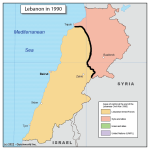Jackson Lennock
Well-known member
What if Bachir Gemayel had not been assassinated?
Gemayel was somebody who could make peace with Israel, but he put Lebanon first. He viewed Lebanon as something other than an Arab country, though with Arab characteristics (for comparison, think of Malta or Sicily I suppose). He rejected partition and (if I am understanding correctly) cantonalization. He led the Maronite militias and was from a Phalange background, but wasn't ideologically committed to the Phalange's ideas himself. His first priority was a nondenominational Lebanon, and I imagine he was not going to make peace with Israel his priority in that respect (much to the consternation of Begin and Sharon, who really were less-than-realistic about what they could achieve in Lebanon). A path-to-peace agreement in which an opening of some trade relations, a framework for eventual normalization being established could be achieved, and a joint commitment against the PLO could be attained though.
Without Gemayel's death, there would be no Sabra and Shatila. Whether it's the Phalange or the Lebanese Army which sweeps the camps to clear out remaining PLO elements (the Israelis tried to get the Lebanese Army to do it instead, out of some sense that the Phalange may have too much bloodlust after Gemayel's assassination), the lack of a desire for revenge by the Phalange would prevent the massacre seen historically. Israel's withdrawal from Lebanon would accordingly be slower, and the country's government would be better able to secure itself in the Israeli-occupied portions.
With the Christians already united under him, the easiest group to bring into his tent would probably be the Southern wing of Amal. The Shia of South Lebanon had gotten sick of the Palestinians and greeted the Israelis as liberators when they first moved into the country. The Southern branch of Amal historically offered to be peacekeeper for the Israelis, but the Israelis went with the South Lebanon Army instead.
Meanwhile, Bachir's brother Amine didn't have the force of will or respect from others to establish himself as leader of the Government. Bachir's charisma and forcefulness helped mend and unite class divides and factionalism in Maronite society that his brother while President OTL couldn't. The result was that he had neither the manpower or the revenues to actually govern. A slower Israeli withdrawal, handing over of positions to the Lebanese Government of Bachir, and integration of the Shia of South Lebanon into Bachir's government would be very different than OTL's chaotic mess.
The make-or-break moment would be the Mountain War in the Chouf against Jumblatt's Progressive Socialist Party-led National Salvation Front.
Gemayel was somebody who could make peace with Israel, but he put Lebanon first. He viewed Lebanon as something other than an Arab country, though with Arab characteristics (for comparison, think of Malta or Sicily I suppose). He rejected partition and (if I am understanding correctly) cantonalization. He led the Maronite militias and was from a Phalange background, but wasn't ideologically committed to the Phalange's ideas himself. His first priority was a nondenominational Lebanon, and I imagine he was not going to make peace with Israel his priority in that respect (much to the consternation of Begin and Sharon, who really were less-than-realistic about what they could achieve in Lebanon). A path-to-peace agreement in which an opening of some trade relations, a framework for eventual normalization being established could be achieved, and a joint commitment against the PLO could be attained though.
Without Gemayel's death, there would be no Sabra and Shatila. Whether it's the Phalange or the Lebanese Army which sweeps the camps to clear out remaining PLO elements (the Israelis tried to get the Lebanese Army to do it instead, out of some sense that the Phalange may have too much bloodlust after Gemayel's assassination), the lack of a desire for revenge by the Phalange would prevent the massacre seen historically. Israel's withdrawal from Lebanon would accordingly be slower, and the country's government would be better able to secure itself in the Israeli-occupied portions.
With the Christians already united under him, the easiest group to bring into his tent would probably be the Southern wing of Amal. The Shia of South Lebanon had gotten sick of the Palestinians and greeted the Israelis as liberators when they first moved into the country. The Southern branch of Amal historically offered to be peacekeeper for the Israelis, but the Israelis went with the South Lebanon Army instead.
Meanwhile, Bachir's brother Amine didn't have the force of will or respect from others to establish himself as leader of the Government. Bachir's charisma and forcefulness helped mend and unite class divides and factionalism in Maronite society that his brother while President OTL couldn't. The result was that he had neither the manpower or the revenues to actually govern. A slower Israeli withdrawal, handing over of positions to the Lebanese Government of Bachir, and integration of the Shia of South Lebanon into Bachir's government would be very different than OTL's chaotic mess.
The make-or-break moment would be the Mountain War in the Chouf against Jumblatt's Progressive Socialist Party-led National Salvation Front.


